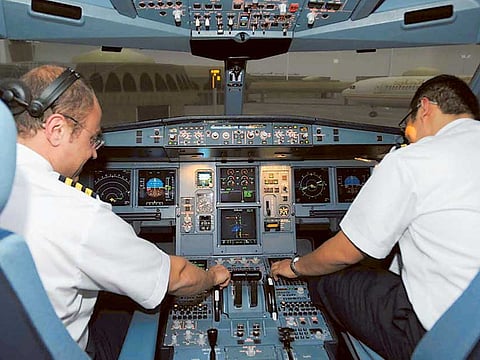Etihad employing 200 pilots from equity airlines
Airline filling sought-after industry positions with employees from airlines it holds stakes in

Dubai: Etihad Airways' capital intensive strategy of purchasing minority stakes in other airlines to expand its network is also helping it fill highly sought-after positions.
Etihad is currently employing “almost 200” pilots on a secondment basis from equity airlines, it said in an emailed statement on Sunday.
It is widely accepted airlines are expanding much faster than the number of necessary skilled workers needed in the industry.
In July 2014, manufacturer Boeing increased its 20 years forecast for global demand for commercial airlines by 7 per cent to 533,000. This includes 55,000 needed in the Middle East, partially due to the rapid expansion plans of the regions major airlines Etihad, Emirates and Qatar Airways.
Etihad has been employing pilots from its equity airlines since April 2013 when the first batch of Air Berlin pilots joined the airline on secondment, according to Sunday’s statement.
It now employs 52 pilots from Air Berlin, and a further six from subsidiary NIKI, 41 from Alitalia, a further 25 from subsidiary City Liner, and 63 from Jet Airways.
In September 2014, Etihad President and Chief Executive James Hogan said the airline would hire more than 120 Alitalia pilots as part of its €1.758 billion (Dh7.17 billion) investment to take a 49 per cent stake in the airline
Etihad was unavailable to comment on the details of its secondment arrangements, including how long pilots have to stay with Etihad before they can return to their previous employer. But United States-based analyst Addison Schonland, founder and partner at AirInsight, labelled Etihad’s strategy as “brilliant.”
“There is a growing shortage of pilots. Therefore being able to cherry pick the best from within a network is a great advantage. For Etihad this works very well. For the pilots it means getting into this food chain is very attractive,” he said by email.
Etihad has spent billions of dollars investing in minority stakes in eight foreign airlines from Australia to Ireland
Now, Etihad wants to keep these seconded pilots. Etihad said on Sunday it is offering seconded pilots “permanent contracts” to fly “the carrier’s most advanced Airbus and Boeing aircraft.”
Etihad has ordered ten Airbus A380s and 71 Boeing 787s. It has received three of each, according to its website. Etihad is arguing that it can offer greater career opportunities than legacy airlines like the ones it has invested in to help build its network and feed passengers from Italy, Germany, Serbia India, Australia and the Seychelles in to its Abu Dhabi hub.
“The average time to command at Etihad Airways is in the range of three years while it takes at least 10 to 15 years to achieve the same position in most legacy carriers,” Etihad said in the statement.
Adding that it “offers a much more varied career path with opportunities for cross fleet transfers from Airbus to Boeing and narrow-body to wide-body aircraft, as well as progression to a wide range of roles like flight instructors, examiners, flight crew assessors and pilot management positions.”
For the equity airlines this poses “a challenge because their best and brightest will move on to [Etihad],” Schonland said, but also means they are able to attract new pilots by offering “a chance to get into the Etihad fleet.”
To date, 21 former Air Berlin pilots have shifted over to Etihad on a permanent basis, Etihad said.
Sign up for the Daily Briefing
Get the latest news and updates straight to your inbox



